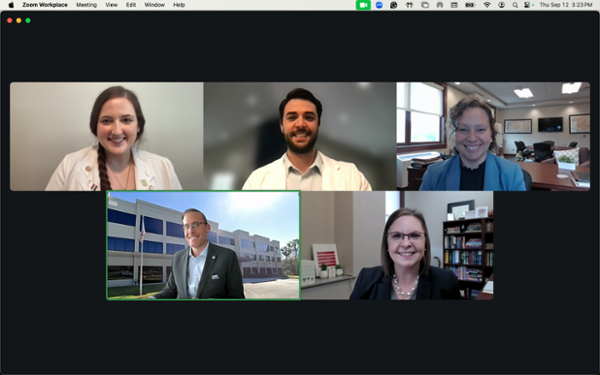
Four faculty members and two students from Lincoln Memorial University-DeBusk College of Osteopathic Medicine (LMU-DCOM) recently met with eight legislative teams to advocate for important health care education bills: the Fair Access in Residency (FAIR) Act (H.R. 751) and the Community Training, Education, and Access for Medical Students (Community TEAMS) Act (H.R. 7258 and S. 3968), as part of the American Association of Colleges of Osteopathic Medicine (AACOM) Advocacy Day.
Drs. Anya Cope, Cassi Jones, Mark Browne, and James Toldi, along with Student Doctors Daulton Swan and Amber Shirley, met with teams from the offices of Sens. Bill Hagerty (R-Tenn.) and Marsha Blackburn (R-Tenn.) and Reps. John Rose (R-Tenn.), Tim Burchett (R-Tenn.), and Diana Harshbarger (R-Tenn.). Drs. Browne and Cope also met with teams from the offices of Sens. Pete Ricketts (R-Neb.) and Deb Fischer (R-Neb.) and Rep. Adrian Smith (R-Neb.) because of a Core Rotation Site for third- and fourth-year students located at Mary Lanning Healthcare in Hastings, Nebraska.
“Advocating for fellow students, physicians and patients is a great privilege and responsibility, creating a better health care landscape for us all,” Shirley said. “Specifically [during] the AACOM government relations day, advocating for policy priorities affecting equity and training in osteopathic medical education is something I am passionate about.”
The FAIR Act addresses the unfairness some osteopathic medical students can face in the residency application process. The legislation ensures that all Medicare-funded residency programs accept applications from doctors of osteopathic medicine (DOs) and their licensure exam, the Comprehensive Osteopathic Medical Licensing Exam (COMLEX), as an alternative to the United States Medical Licensing Exam (USMLE), taken by allopathic students (MDs).
DO students often face unnecessary obstacles in residency selection. According to the National Resident Matching Program, 29% of residency program directors rarely or never interview DO candidates, and 73% of programs require DO students to take the USMLE in addition to the COMLEX. This leads to significant financial burdens for DO students, who must spend thousands of dollars in additional exam fees and dedicate extra time preparing for a test that is not required for their licensure.
“It is still shocking that after 150 years of being a profession, we still have to jump through hoops that other medical students don't have to based on the letters after our name. We receive the same training plus an extra tool: osteopathic manual manipulation (OMM),” said Swan.
The FAIR Act aims to promote fairness and transparency, helping to strengthen the physician workforce by ensuring DO students are treated fairly in the residency selection process and reducing barriers that contribute to the physician shortage. Rep. Harshbarger became a co-sponsor of the FAIR Act in 2022 after participating in AACOM’s Advocacy Day and continues to support the legislation today.
The Community TEAMS Act focuses on expanding medical training opportunities in federally qualified health centers (FQHCs) and rural health clinics (RHCs), which serve more than 31 million patients at more than 14,000 locations. While 80% of hospital admissions occur outside academic medical centers, only 20% of physician training occurs in these community-based facilities. The Community TEAMS Act will move more medical training to community-based clinics to help meet the health care needs of rural and underserved populations.
“Our mission at LMU-DCOM is to train osteopathic physicians who are ready to serve patients in rural Appalachia and beyond. Training students and residents in the communities that they will serve is the best way to ensure their long-term commitments to these communities,” Cope explained.
Research shows that medical students who train in these settings are more likely to practice in underserved areas, addressing critical physician shortages in regions that most need health care professionals. According to the Health Resources and Services Administration, there is a growing trend toward providing care in community-based clinics rather than academic hospitals. By expanding opportunities for medical students to train in these settings, the Community TEAMS Act aims to better align health care education with the shifting landscape of health care delivery.
“There is a need for physicians, and DOs can help with the problem. DO students make up a fourth of medical students across the nation. However, we continue to face barriers filling the need this nation is desperate for,” said Swan.
Both the FAIR Act and the Community TEAMS Act offer solutions to current challenges in medical education, ensuring that more health care professionals are trained to serve in rural and underserved areas while promoting fairness and diversity in residency opportunities.
“Student Doctors Shirley and Swan were amazing representatives of our profession during AACOM’s Advocacy Day 2024,” said Cope. “Their personal stories and passion for osteopathic medicine really made an impact on every person that we spoke with. It’s great to know that they are two out of over 350 students in LMU-DCOM’s classes of 2025 and 2026, respectively, that will make lasting impacts in the world of medicine.”
The DeBusk College of Osteopathic Medicine is located on the campus of Lincoln Memorial University in Harrogate, Tennessee, and at LMU-Knoxville in Knoxville, Tennessee. LMU-DCOM is an integral part of LMU’s values-based learning community and is dedicated to preparing the next generation of osteopathic physicians to provide health care in the often-underserved region of Appalachia and beyond. For more information about LMU-DCOM, call 1.800.325.0900, ext. 7082, email dcom@LMUnet.edu, or visit us online at http://med.LMUnet.edu.